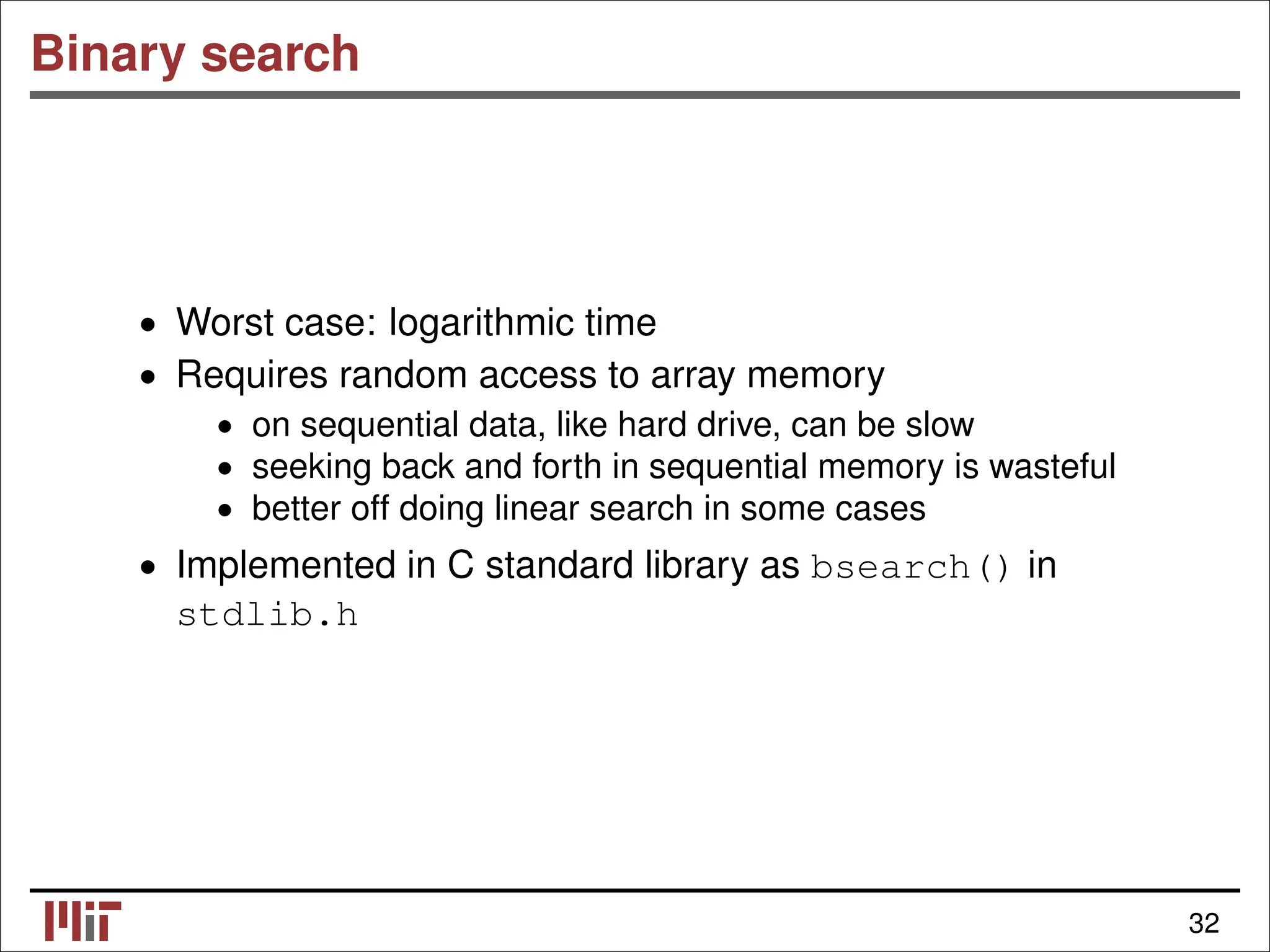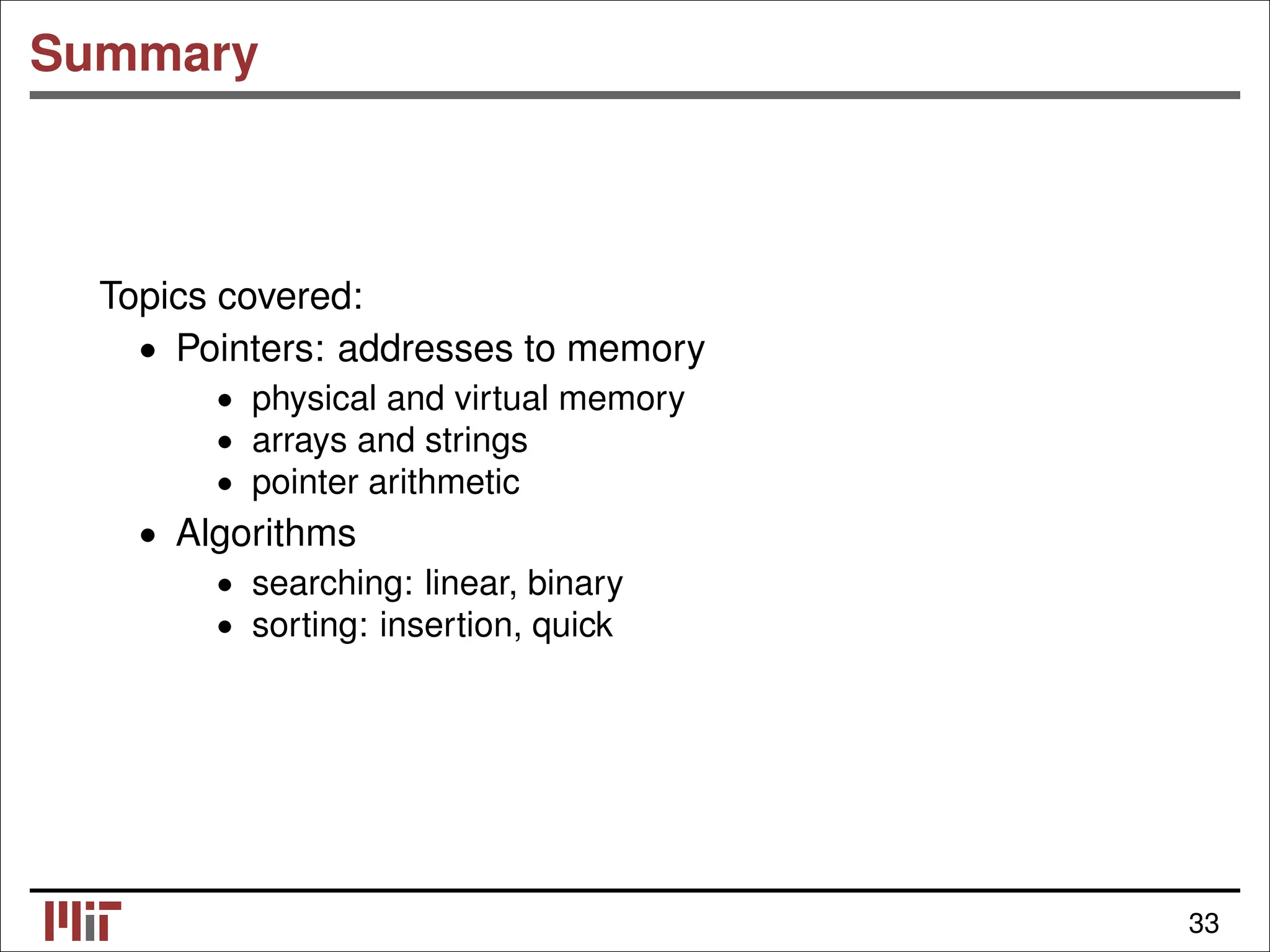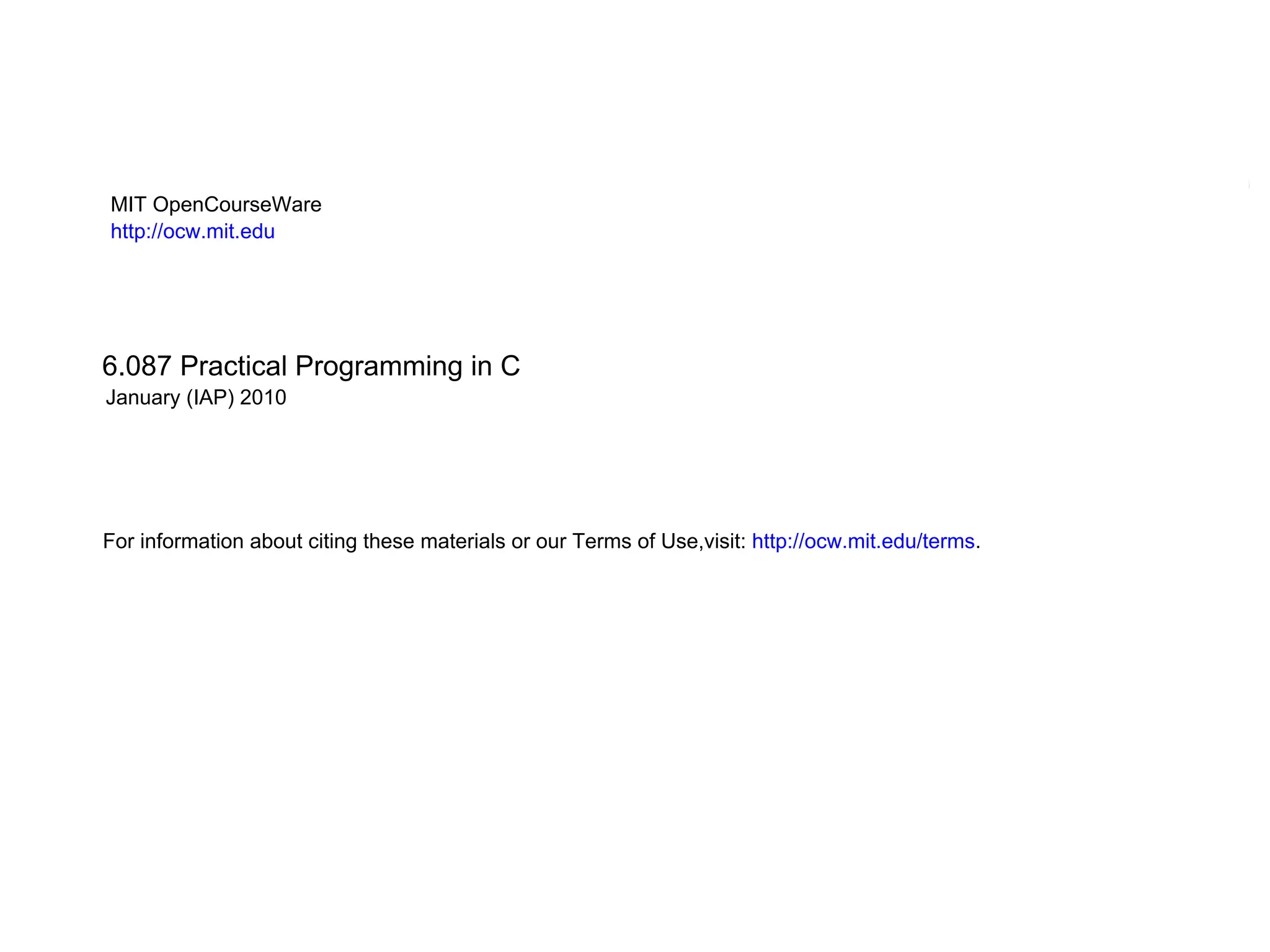Lecture 6.087 discusses concepts of pointers, memory addressing, and functions in C programming, including physical and virtual memory, string handling, and sorting algorithms. Key topics include pointer arithmetic, multiple outputs from functions using pointers, and the implementation of algorithms like linear search and quicksort. The lecture emphasizes the importance of understanding memory management and efficient programming techniques.
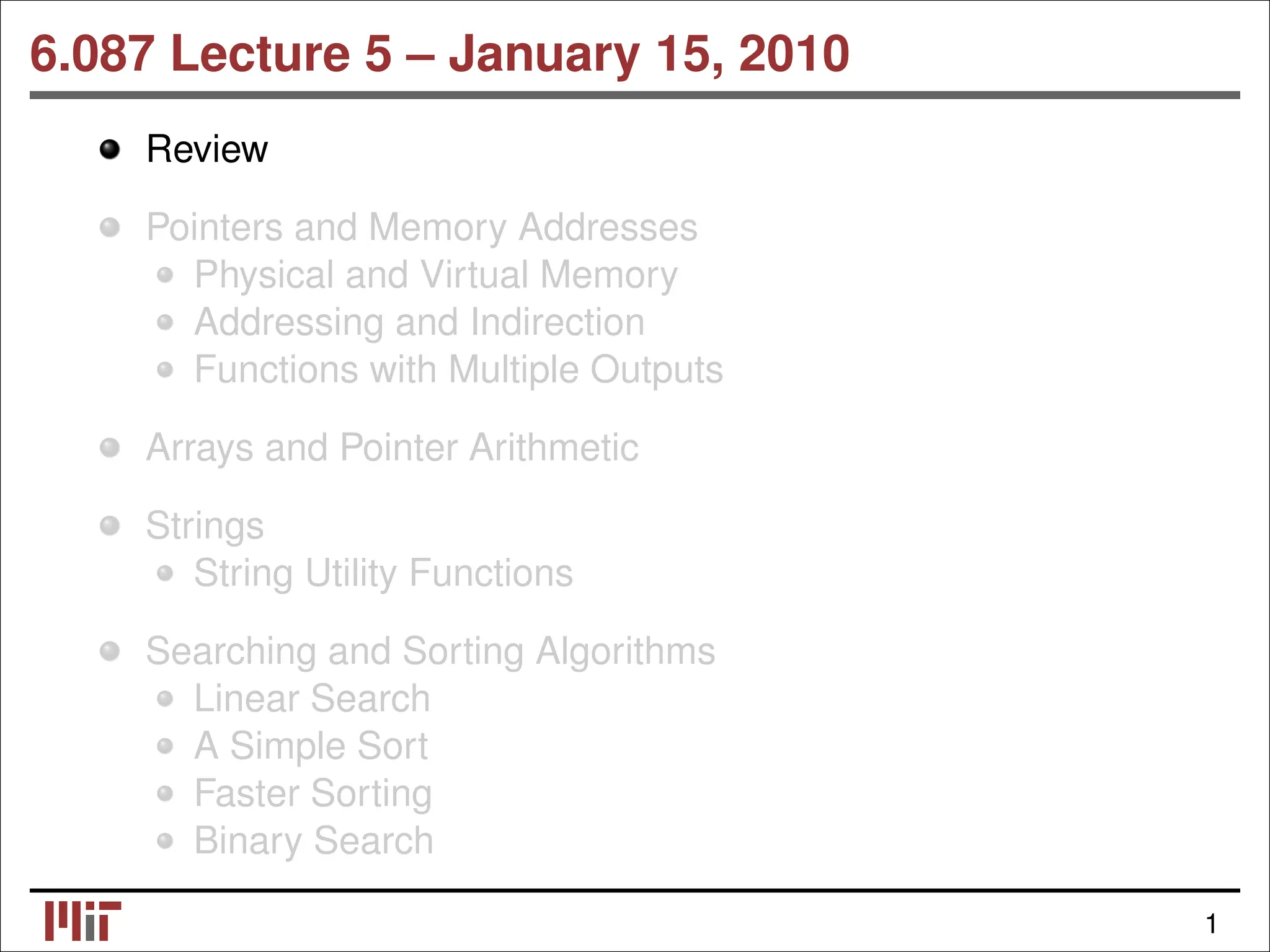
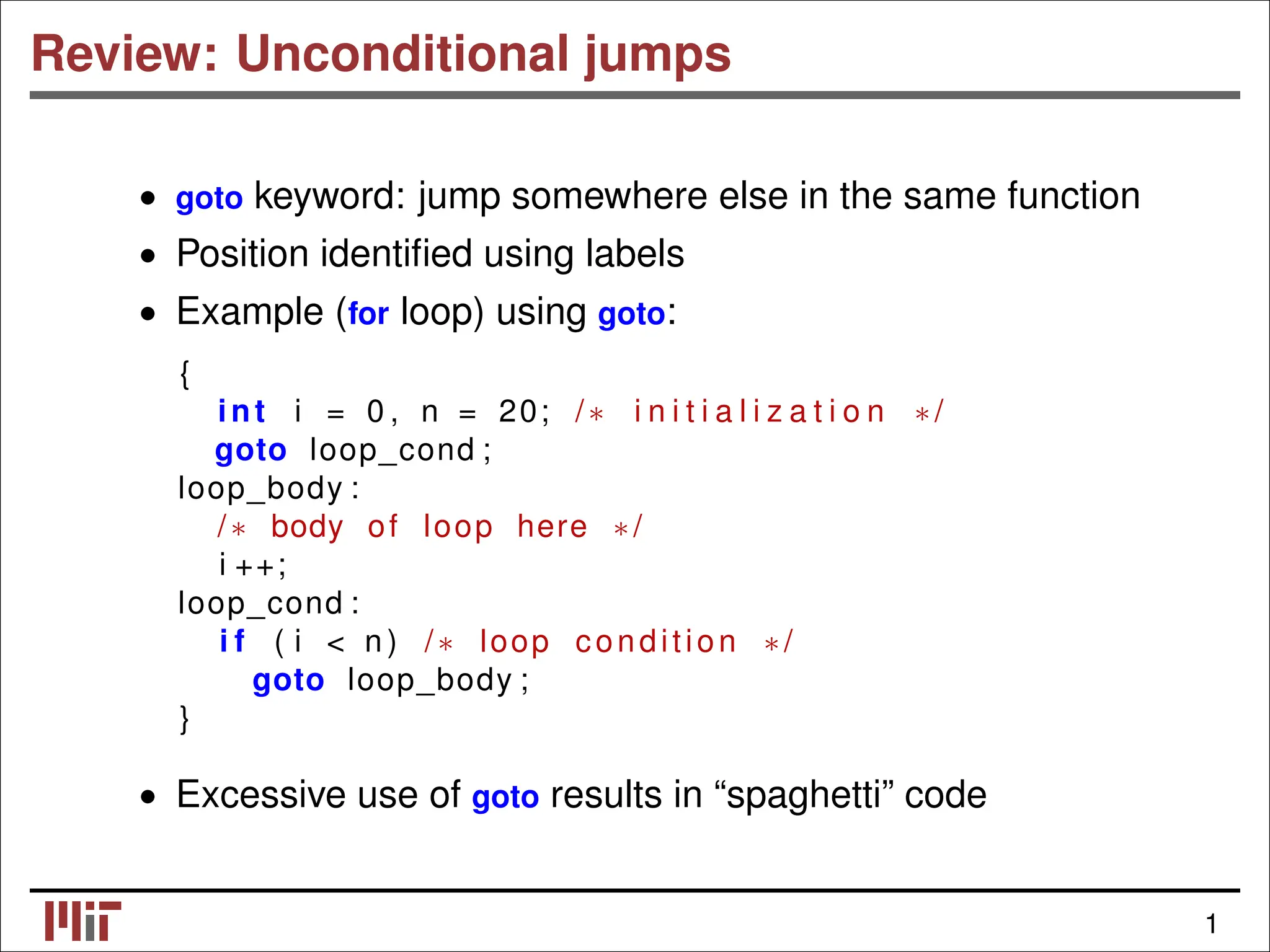
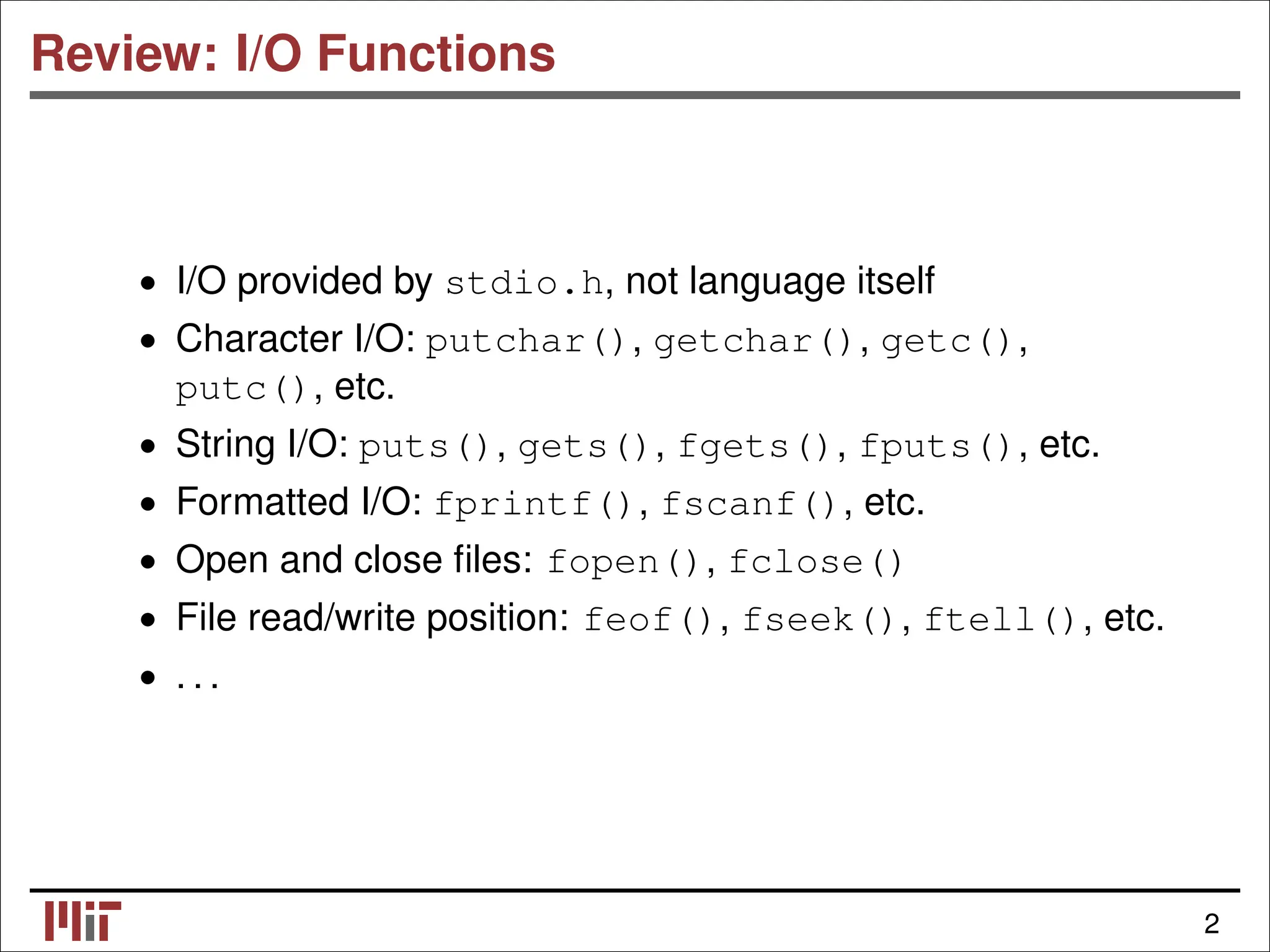
![Review: printf() and scanf() • Formatted output: int printf (char format[], arg1, arg2, ...) • Takes variable number of arguments • Format specification: %[flags][width][.precision][length]<type> • types: d, i (int), u, o, x, X (unsigned int), e, E, f, F, g, G (double), c (char), s (string) • flags, width, precision, length - modify meaning and number of characters printed • Formatted input: scanf() - similar form, takes pointers to arguments (except strings), ignores whitespace in input 3](https://image.slidesharecdn.com/stringc-240816094532-6c0477d4/75/Learn-C-program-in-Complete-c-programing-string-and-its-functions-like-array-pdf-4-2048.jpg)
![Review: Strings and character arrays • Strings represented in C as an array of characters (char []) • String must be null-terminated (’0’ at end) Declaration: • char str [] = "I am a string."; or char str[20] = "I am a string."; • strcpy() - function for copying one string to another • More about strings and string functions today. . . 4](https://image.slidesharecdn.com/stringc-240816094532-6c0477d4/75/Learn-C-program-in-Complete-c-programing-string-and-its-functions-like-array-pdf-5-2048.jpg)
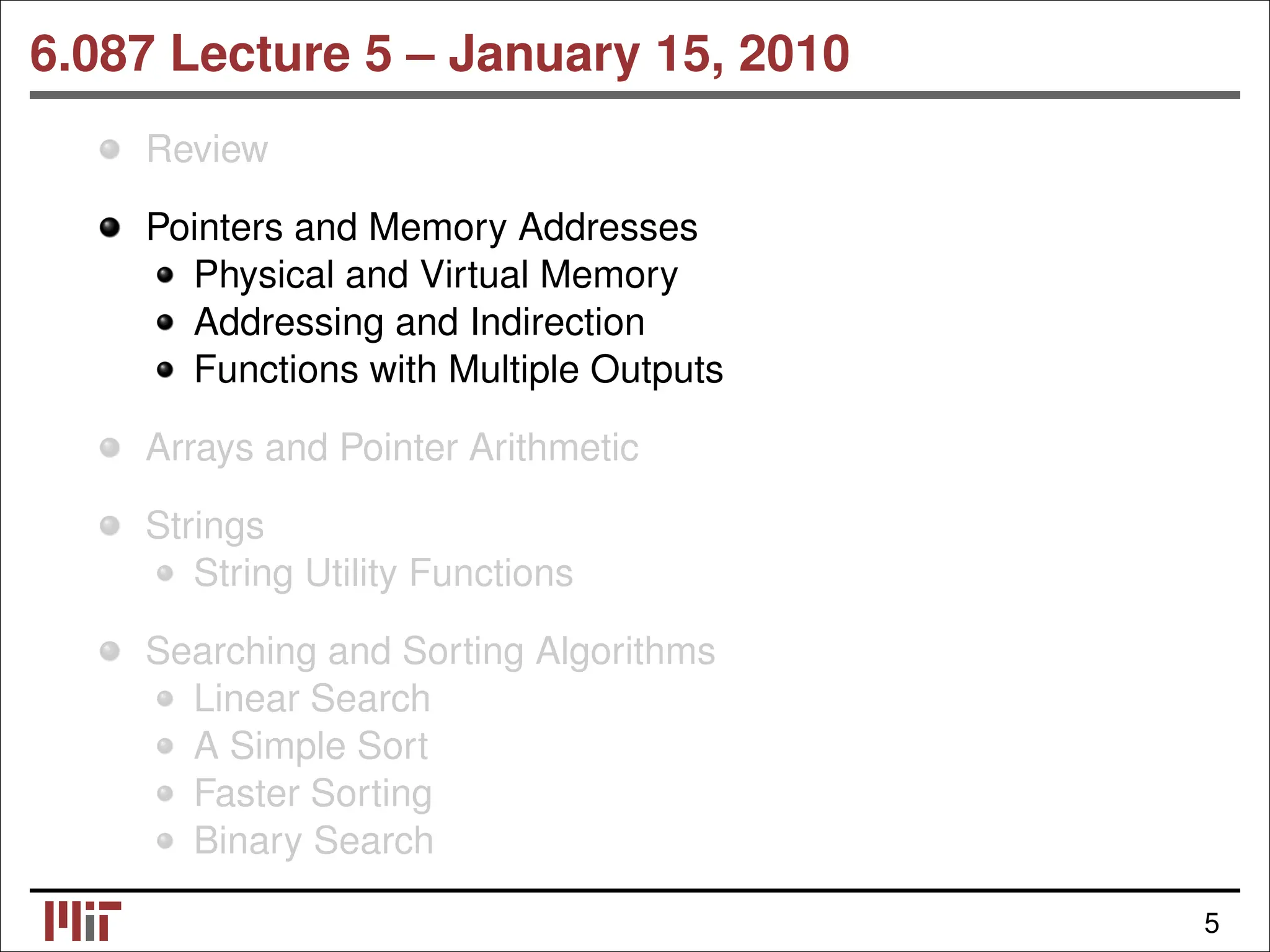
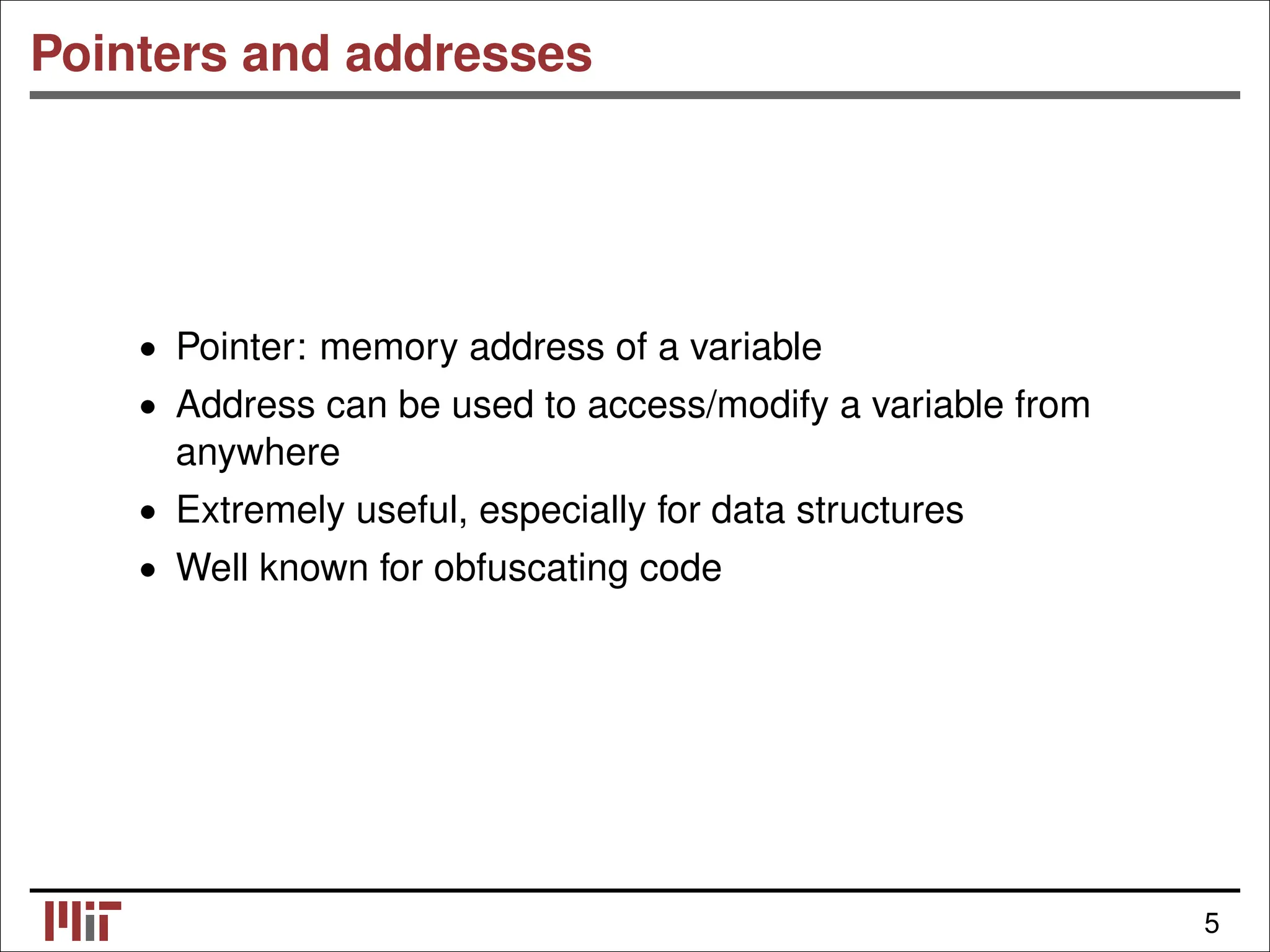
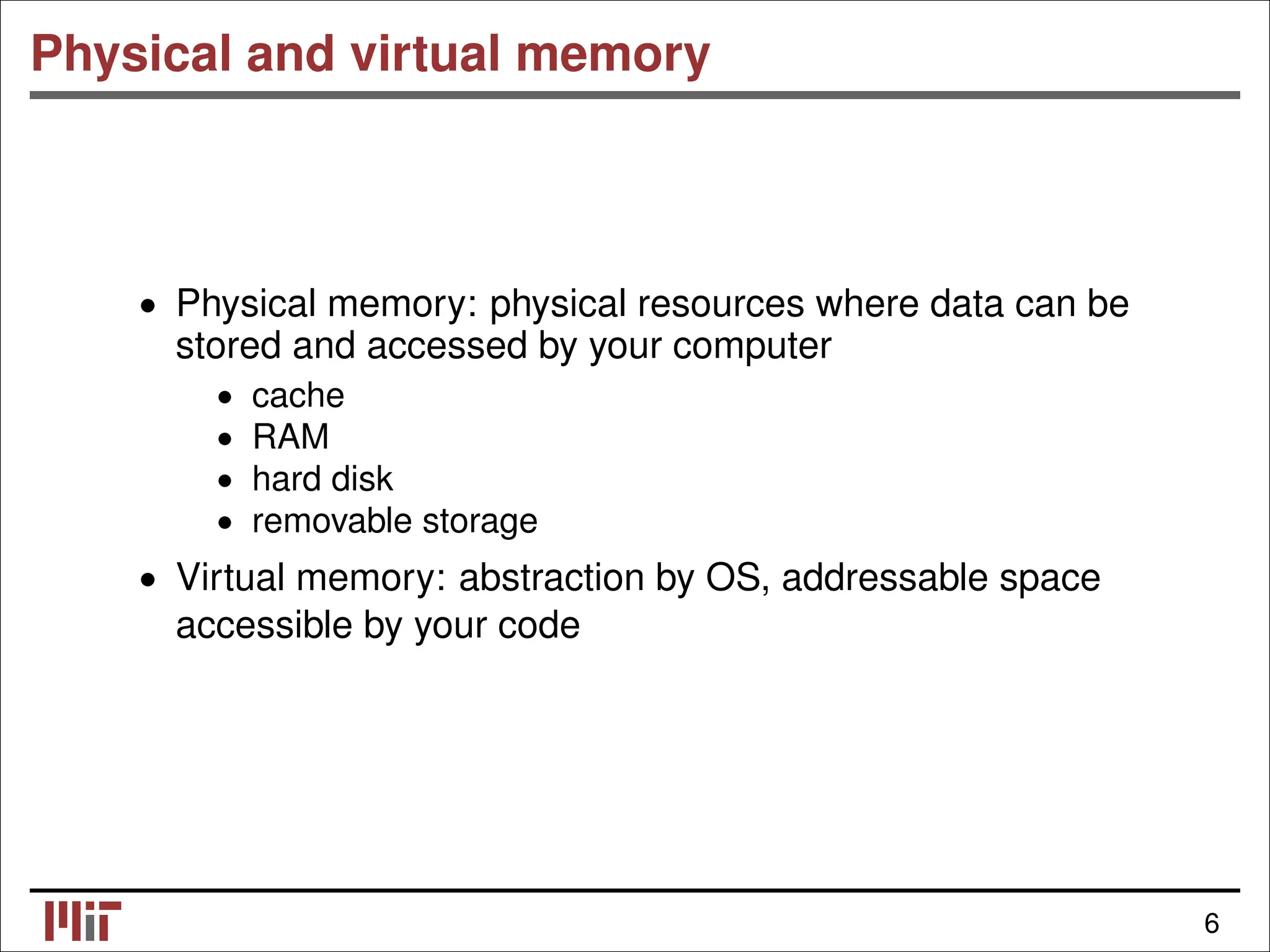
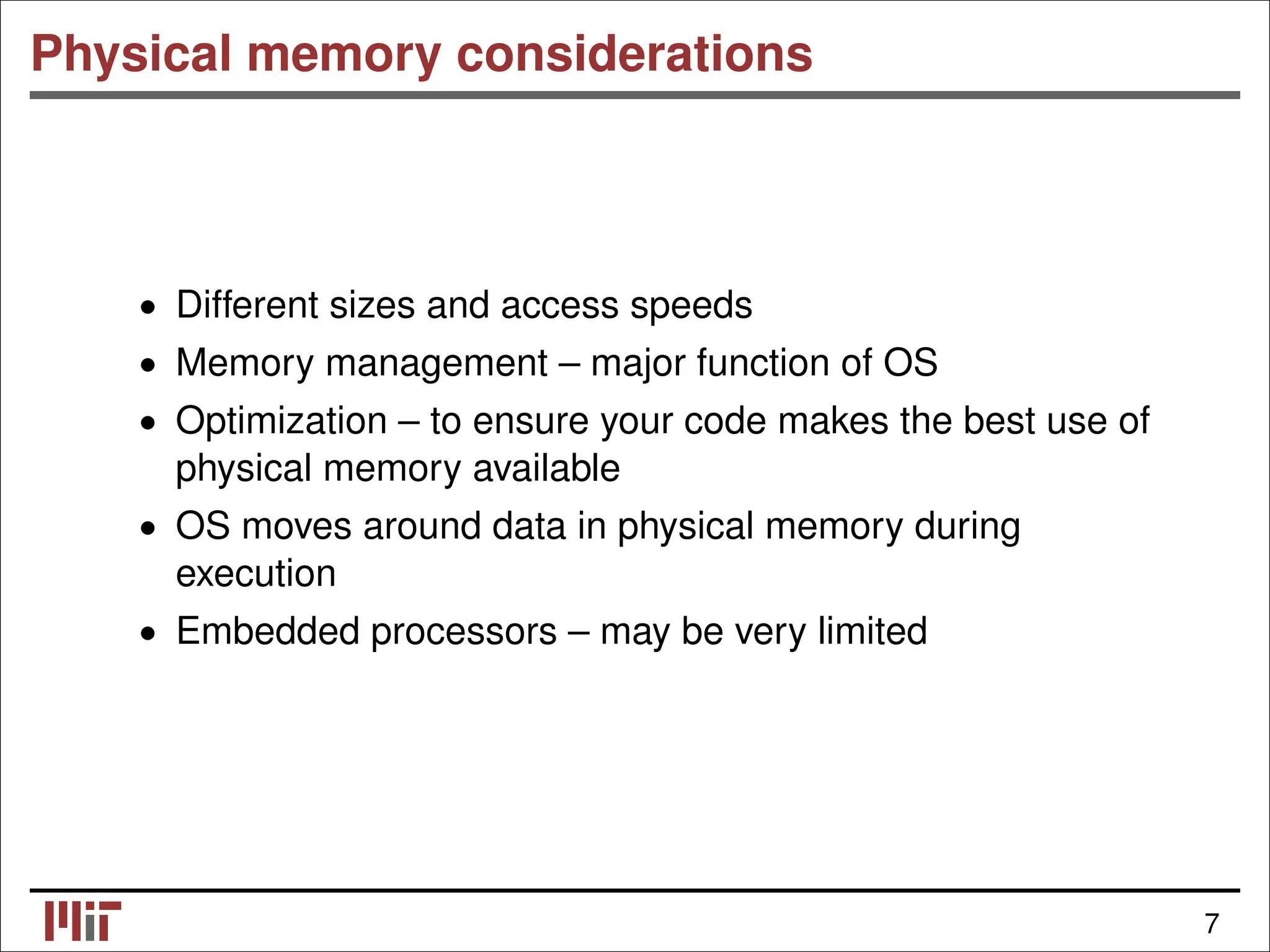
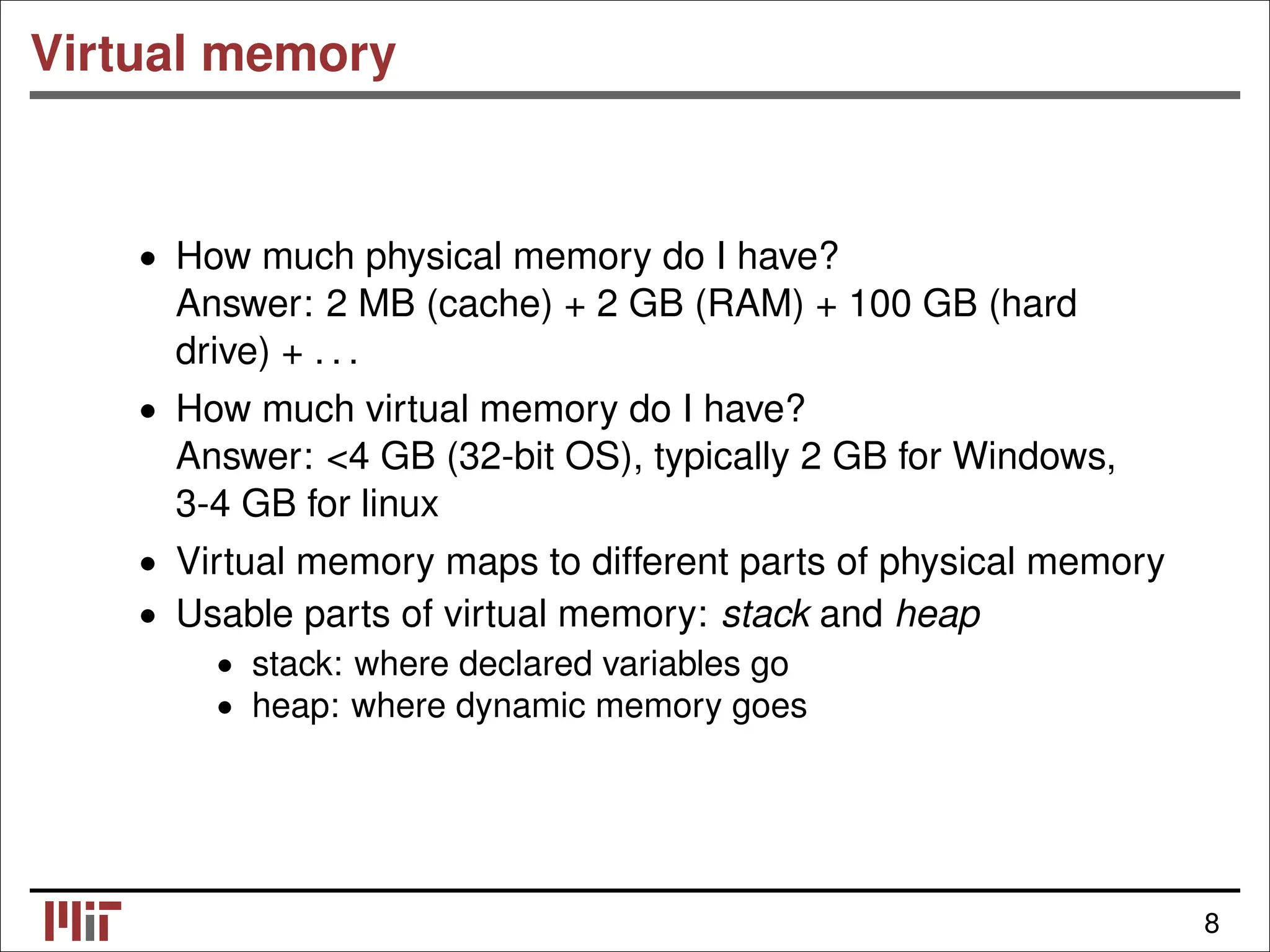
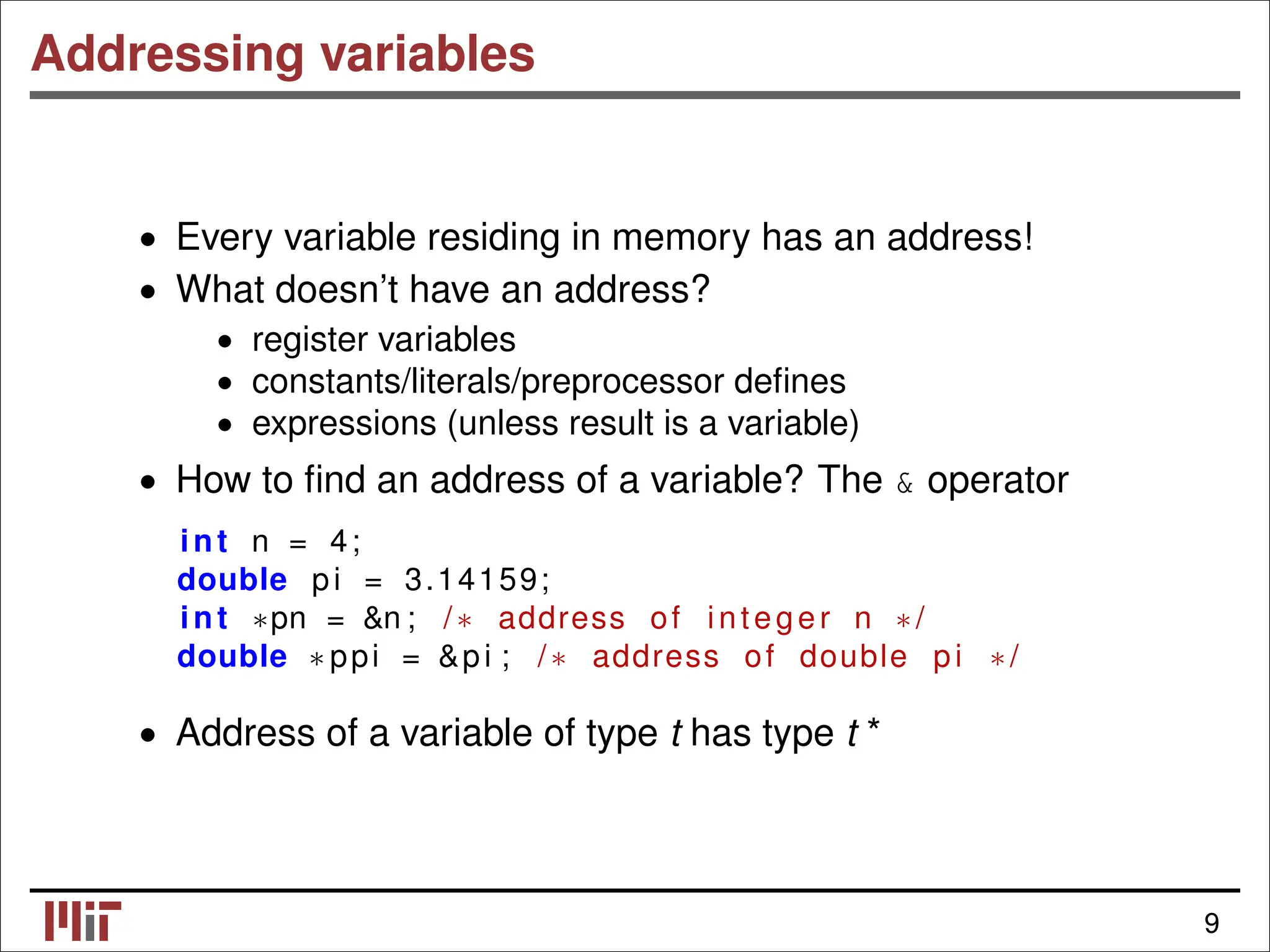
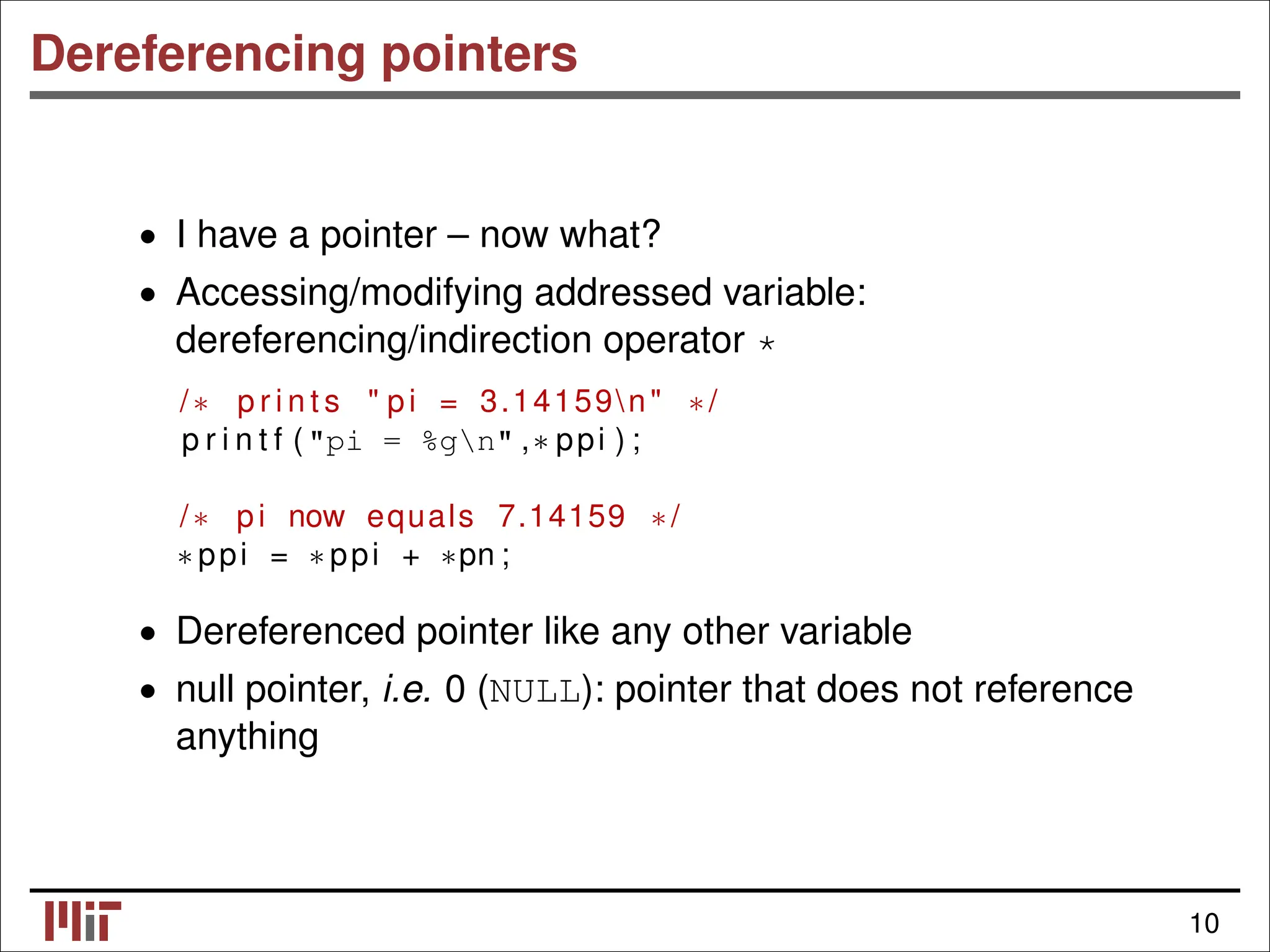
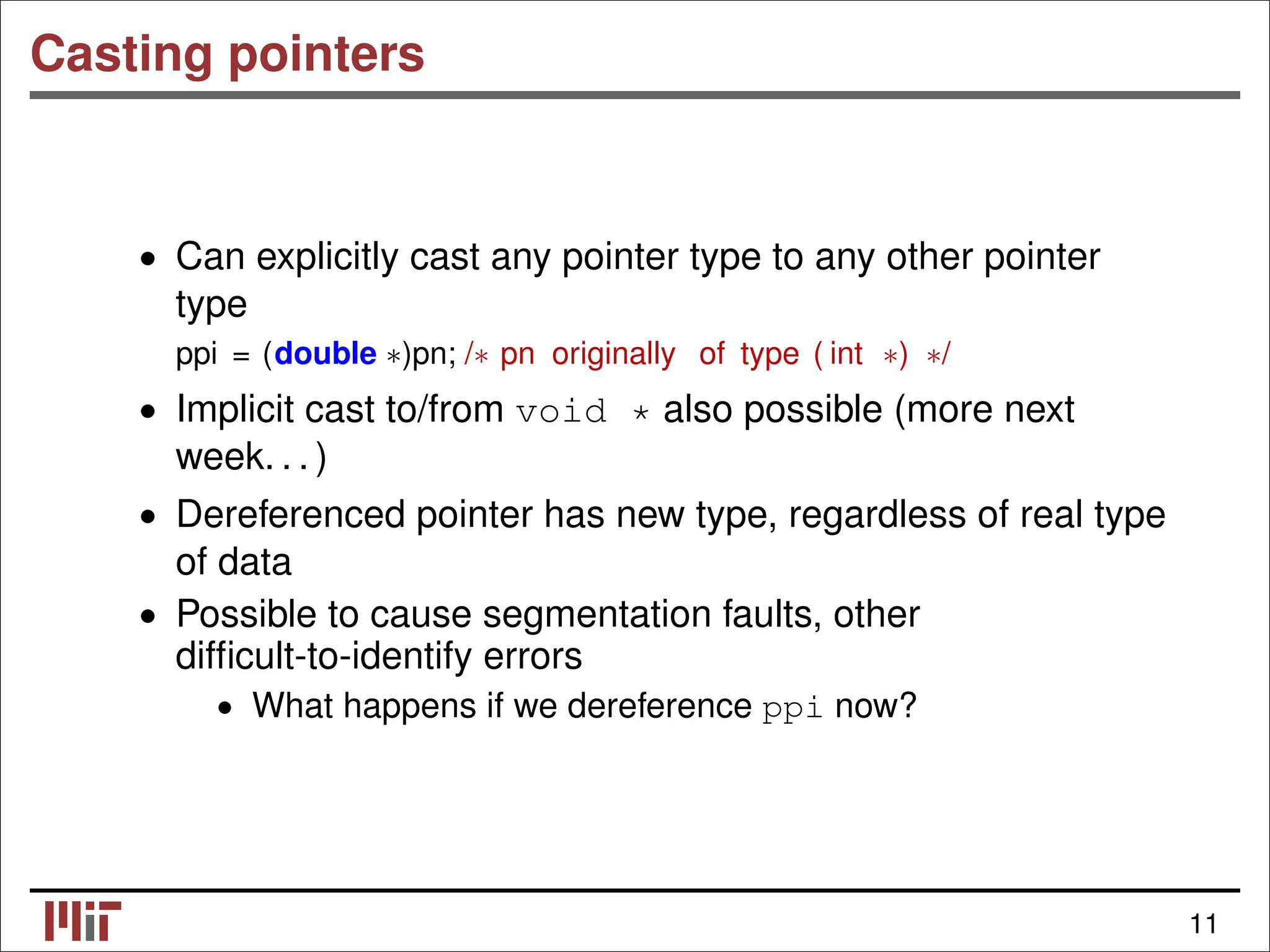
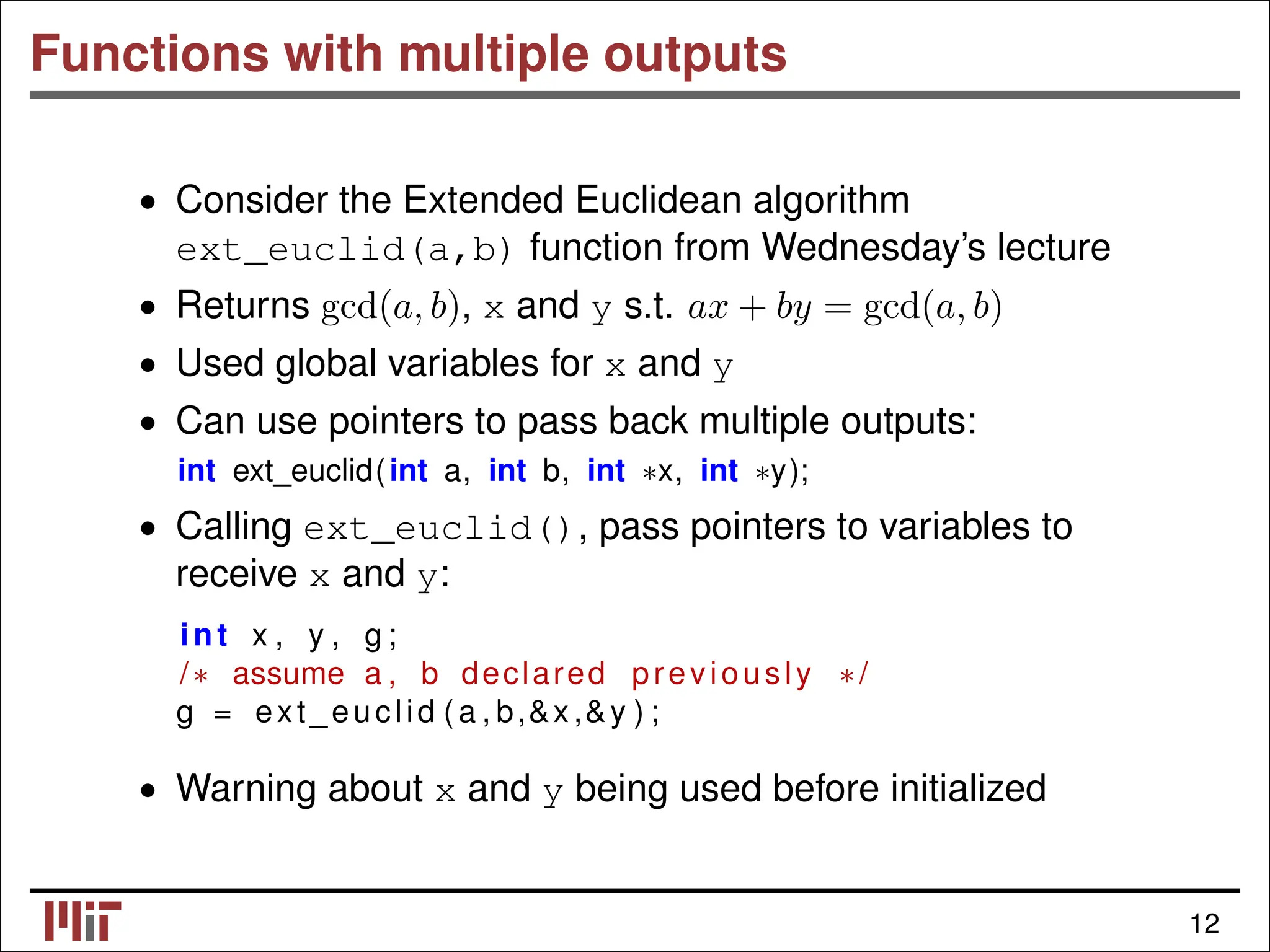
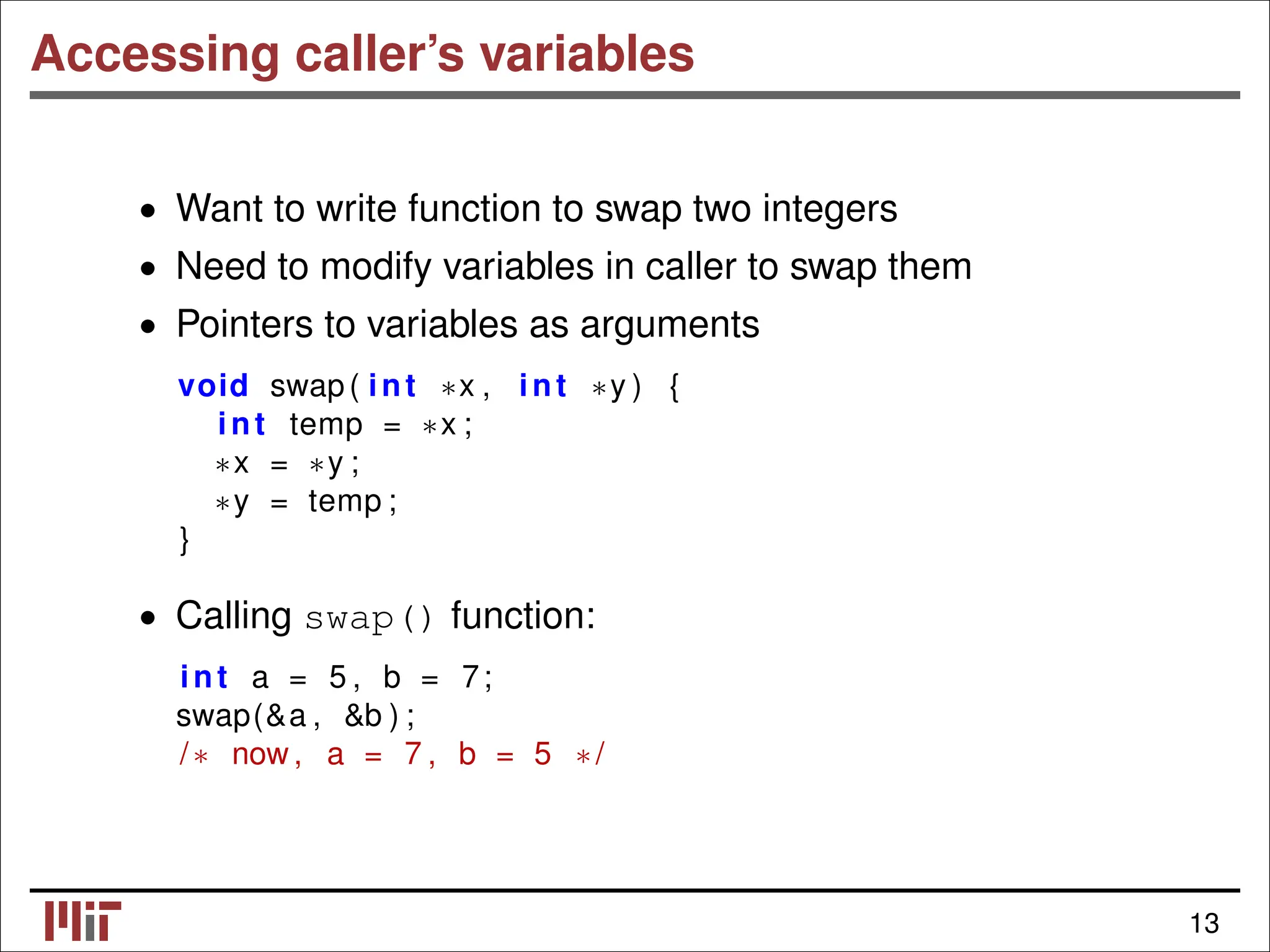
![Variables passing out of scope • What is wrong with this code? #include < stdio . h> char get_message ( ) { ∗ char msg [ ] = "Aren’t pointers fun?" ; return msg; } int main ( void ) { char s t r i n g = get_message ( ) ; ∗ puts ( s t r i n g ) ; return 0; } 14](https://image.slidesharecdn.com/stringc-240816094532-6c0477d4/75/Learn-C-program-in-Complete-c-programing-string-and-its-functions-like-array-pdf-16-2048.jpg)
![Variables passing out of scope • What is wrong with this code? #include < stdio . h> char get_message ( ) { ∗ char msg [ ] = "Aren’t pointers fun?" ; return msg; } int main ( void ) { char s t r i n g = get_message ( ) ; ∗ puts ( s t r i n g ) ; return 0; } • Pointer invalid after variable passes out of scope 14](https://image.slidesharecdn.com/stringc-240816094532-6c0477d4/75/Learn-C-program-in-Complete-c-programing-string-and-its-functions-like-array-pdf-17-2048.jpg)
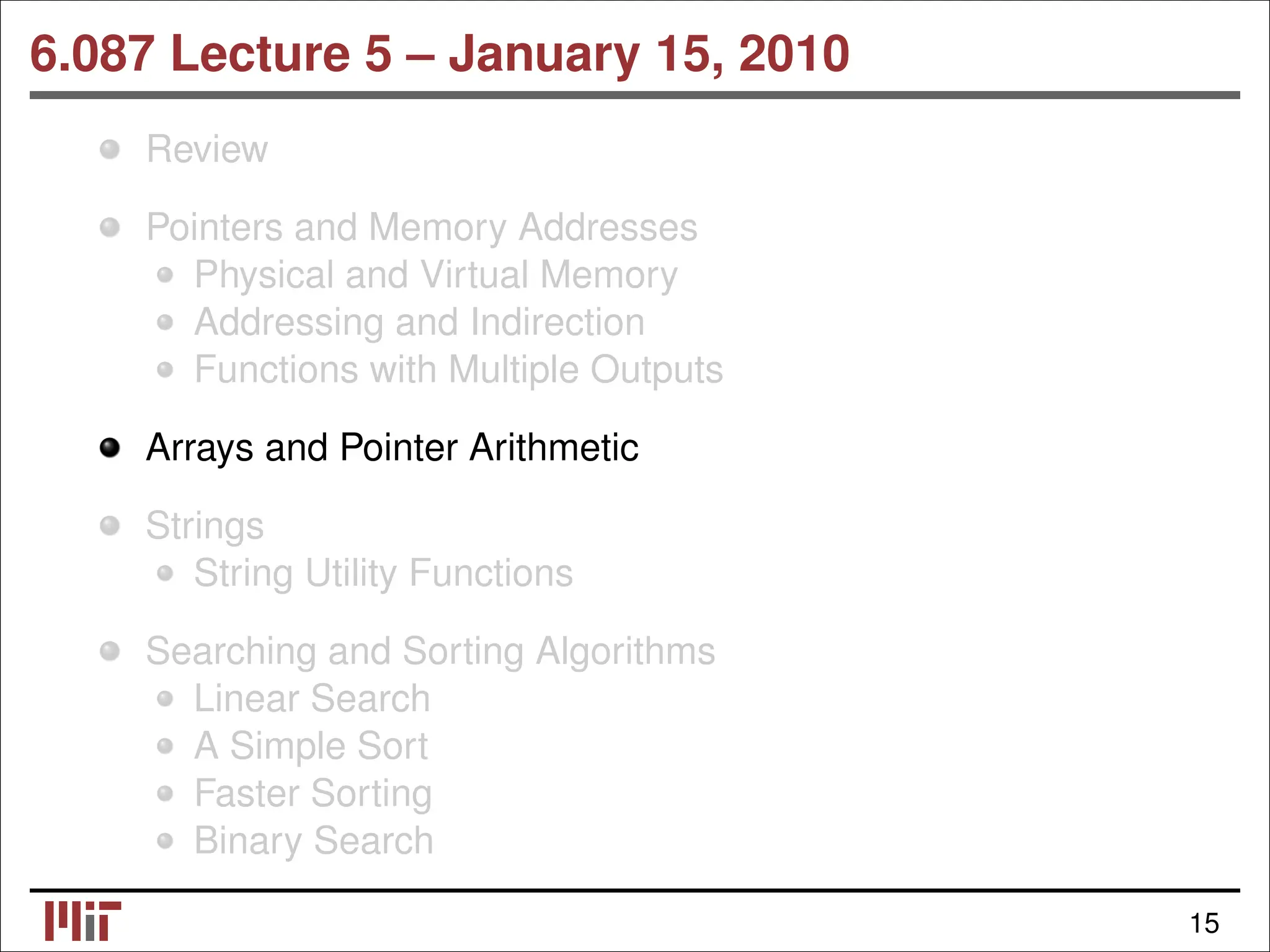
![Arrays and pointers • Primitive arrays implemented in C using pointer to block of contiguous memory • Consider array of 8 ints: int arr [8]; • Accessing arr using array entry operator: int a = arr [0]; • arr is like a pointer to element 0 of the array: int ∗pa = arr; int ∗pa = &arr[0]; ⇔ • Not modifiable/reassignable like a pointer 15](https://image.slidesharecdn.com/stringc-240816094532-6c0477d4/75/Learn-C-program-in-Complete-c-programing-string-and-its-functions-like-array-pdf-19-2048.jpg)
![The sizeof() operator • For primitive types/variables, size of type in bytes: int s = sizeof(char); /∗ == 1 ∗/ double f; /∗ sizeof(f) == 8 ∗/ (64-bit OS) • For primitive arrays, size of array in bytes: int arr [8]; /∗ sizeof(arr) == 32 ∗/ (64-bit OS) long arr [5]; /∗ sizeof(arr) == 40 ∗/ (64-bit OS) • Array length: /∗ needs to be on one l i n e when implemented ∗/ #define array_length ( arr ) ( sizeof ( arr ) == 0 ? 0 : sizeof ( arr ) / sizeof ( ( arr ) [ 0 ] ) ) • More about sizeof() next week. . . 16](https://image.slidesharecdn.com/stringc-240816094532-6c0477d4/75/Learn-C-program-in-Complete-c-programing-string-and-its-functions-like-array-pdf-20-2048.jpg)
![Pointer arithmetic • Suppose int ∗pa = arr; • Pointer not an int, but can add or subtract an int from a pointer: pa + i points to arr[i] • Address value increments by i times size of data type Suppose arr[0] has address 100. Then arr[3] has address 112. • Suppose char ∗ pc = (char ∗)pa; What value of i satisfies (int ∗)(pc+i) == pa + 3? 17](https://image.slidesharecdn.com/stringc-240816094532-6c0477d4/75/Learn-C-program-in-Complete-c-programing-string-and-its-functions-like-array-pdf-21-2048.jpg)
![Pointer arithmetic • Suppose int ∗pa = arr; • Pointer not an int, but can add or subtract an int from a pointer: pa + i points to arr[i] • Address value increments by i times size of data type Suppose arr[0] has address 100. Then arr[3] has address 112. • Suppose char ∗ pc = (char ∗)pa; What value of i satisfies (int ∗)(pc+i) == pa + 3? i = 12 • 17](https://image.slidesharecdn.com/stringc-240816094532-6c0477d4/75/Learn-C-program-in-Complete-c-programing-string-and-its-functions-like-array-pdf-22-2048.jpg)
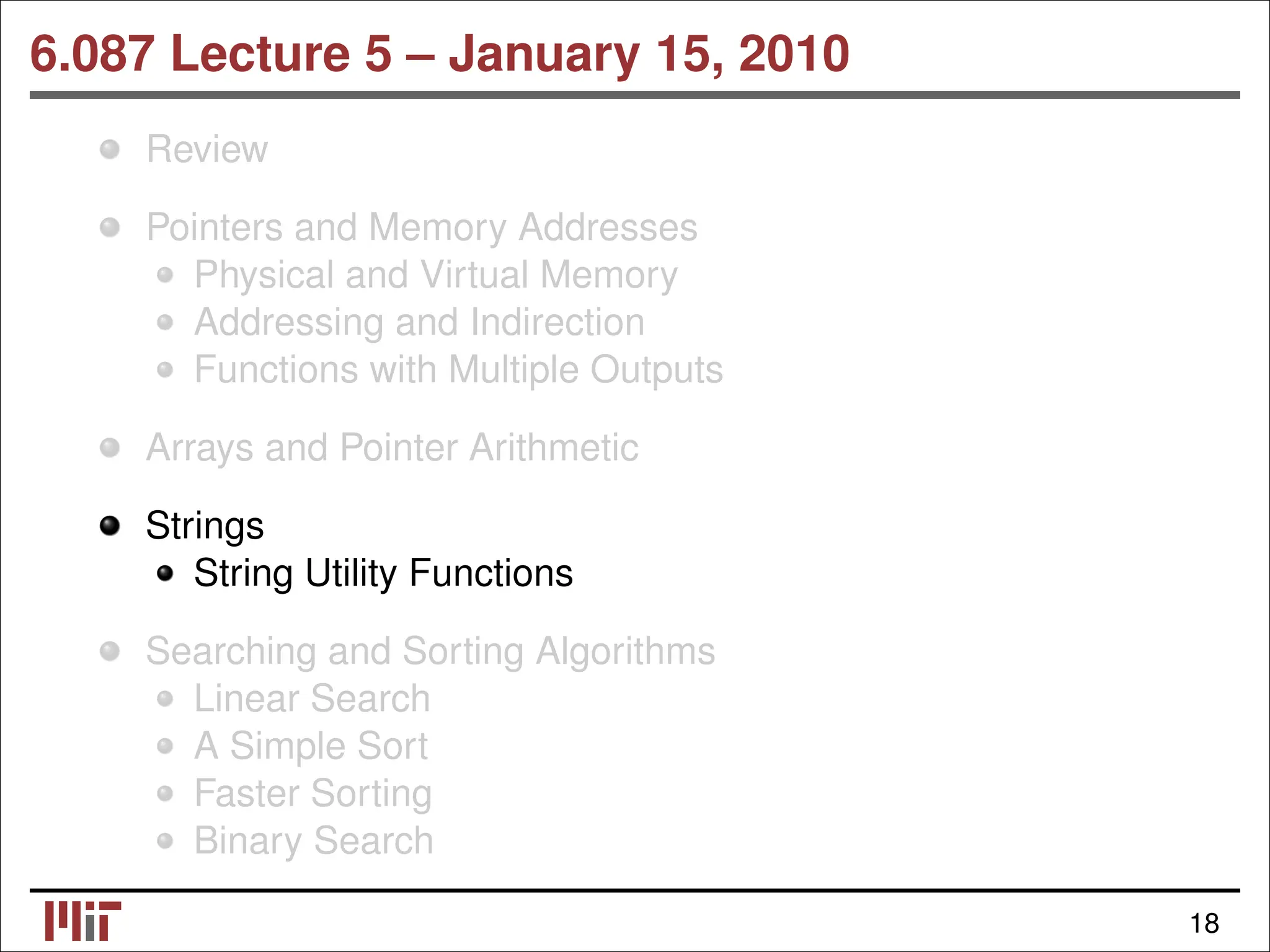
![Strings as arrays • Strings stored as null-terminated character arrays (last character == ’0’) • Suppose char str [] = "This is a string."; and char ∗ pc = str ; • Manipulate string as you would an array ∗(pc+10) = ’S’; puts(str ); /∗ prints "This is a String ." ∗/ 18](https://image.slidesharecdn.com/stringc-240816094532-6c0477d4/75/Learn-C-program-in-Complete-c-programing-string-and-its-functions-like-array-pdf-24-2048.jpg)
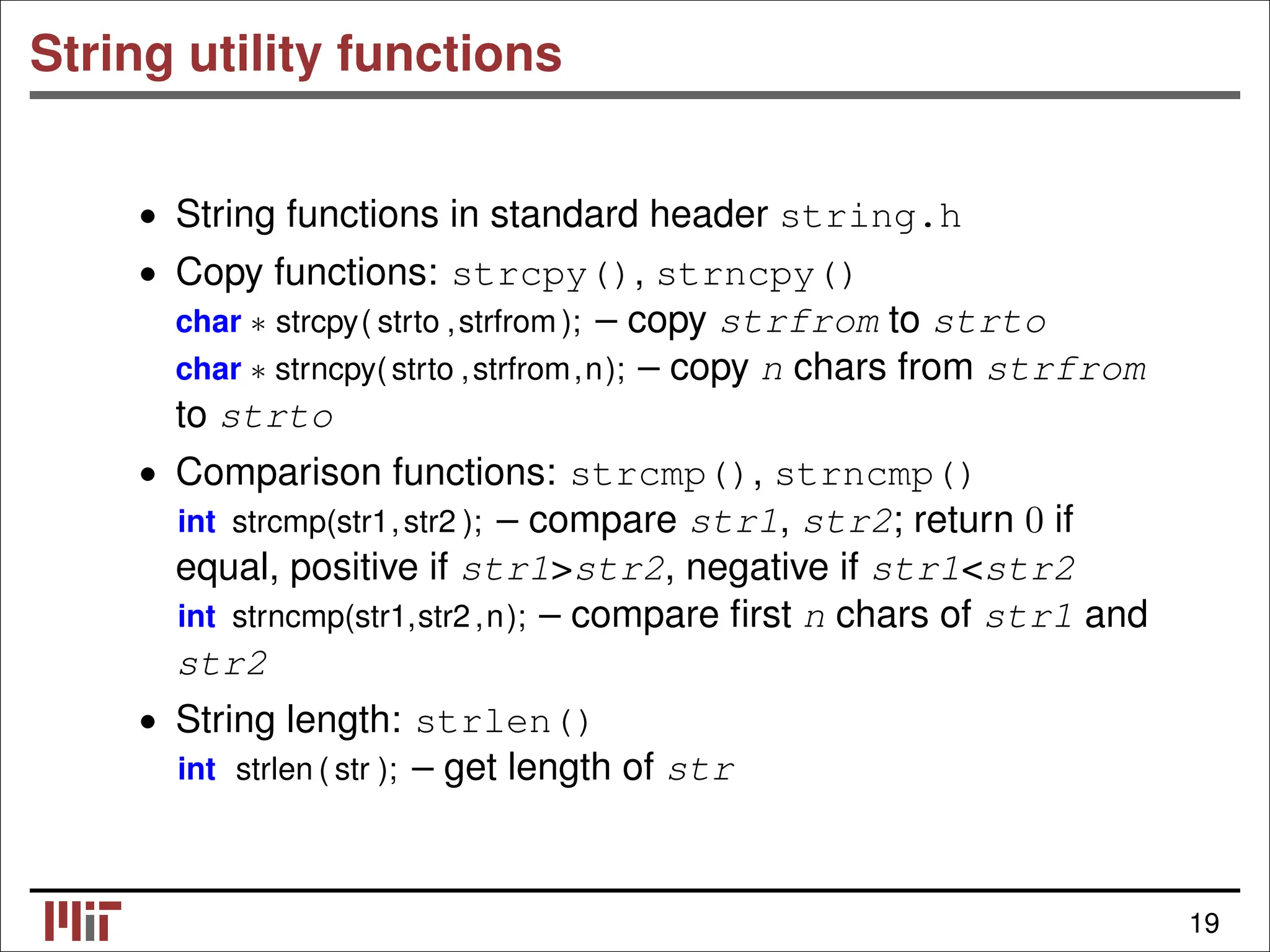
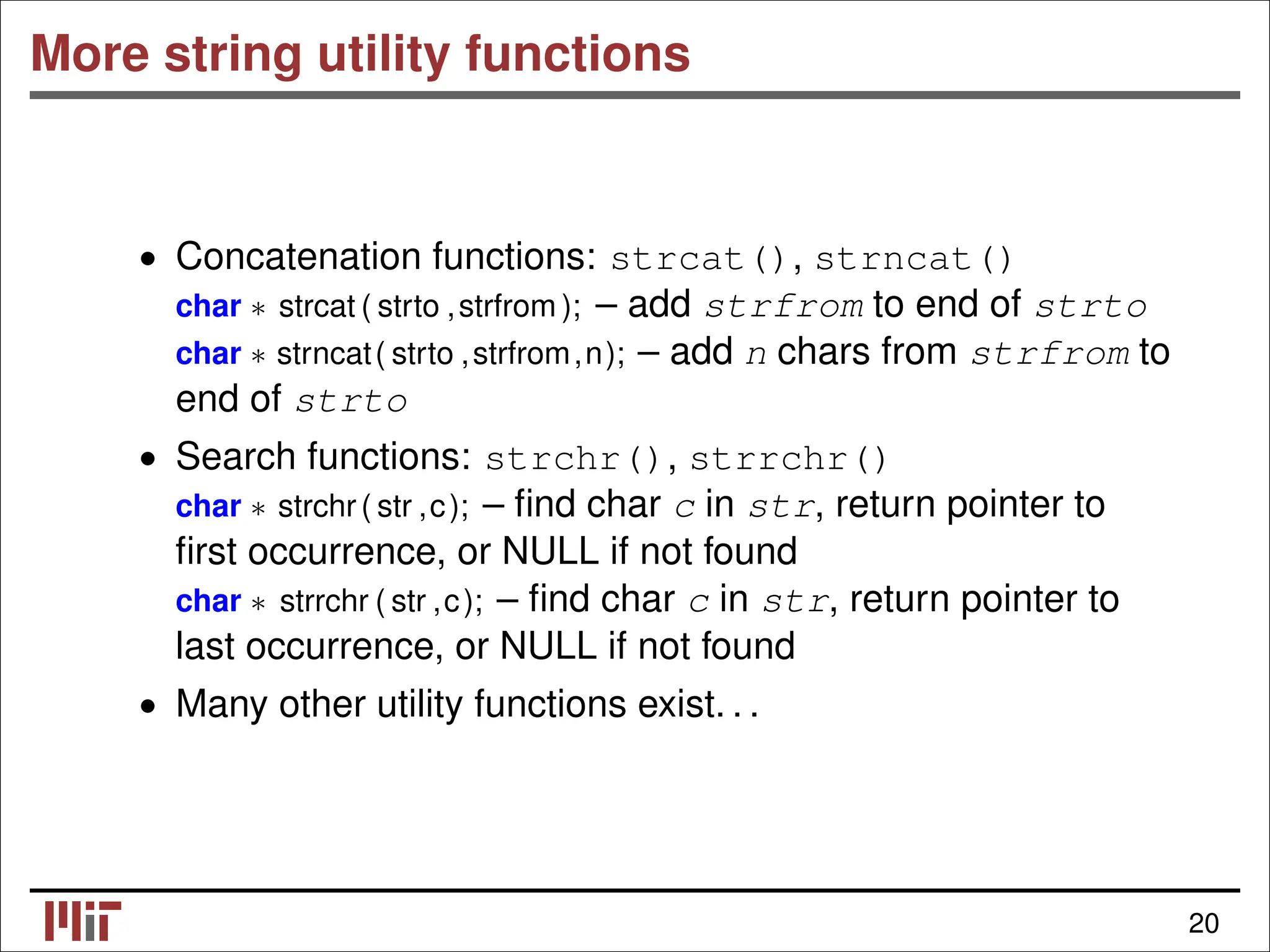
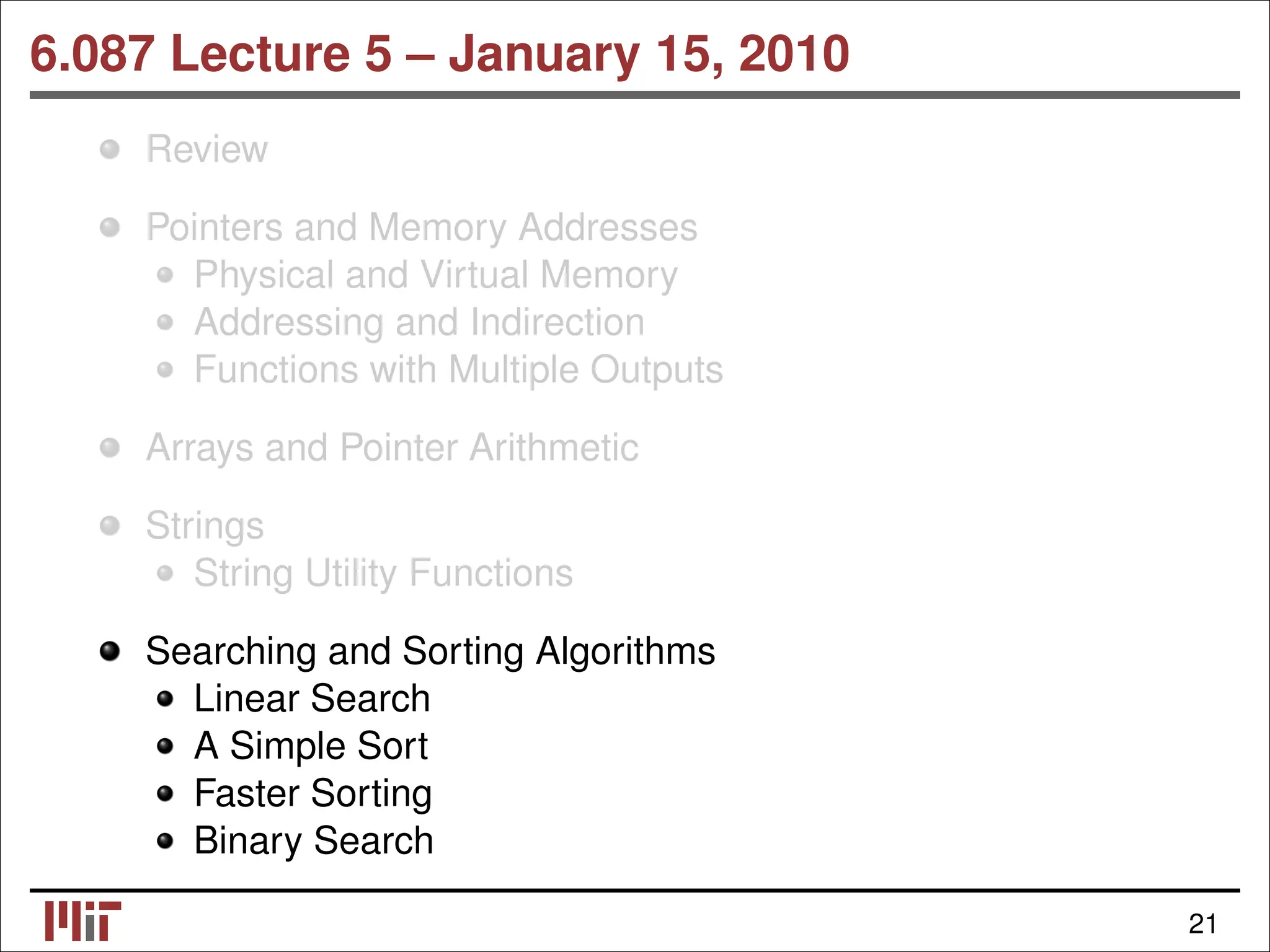
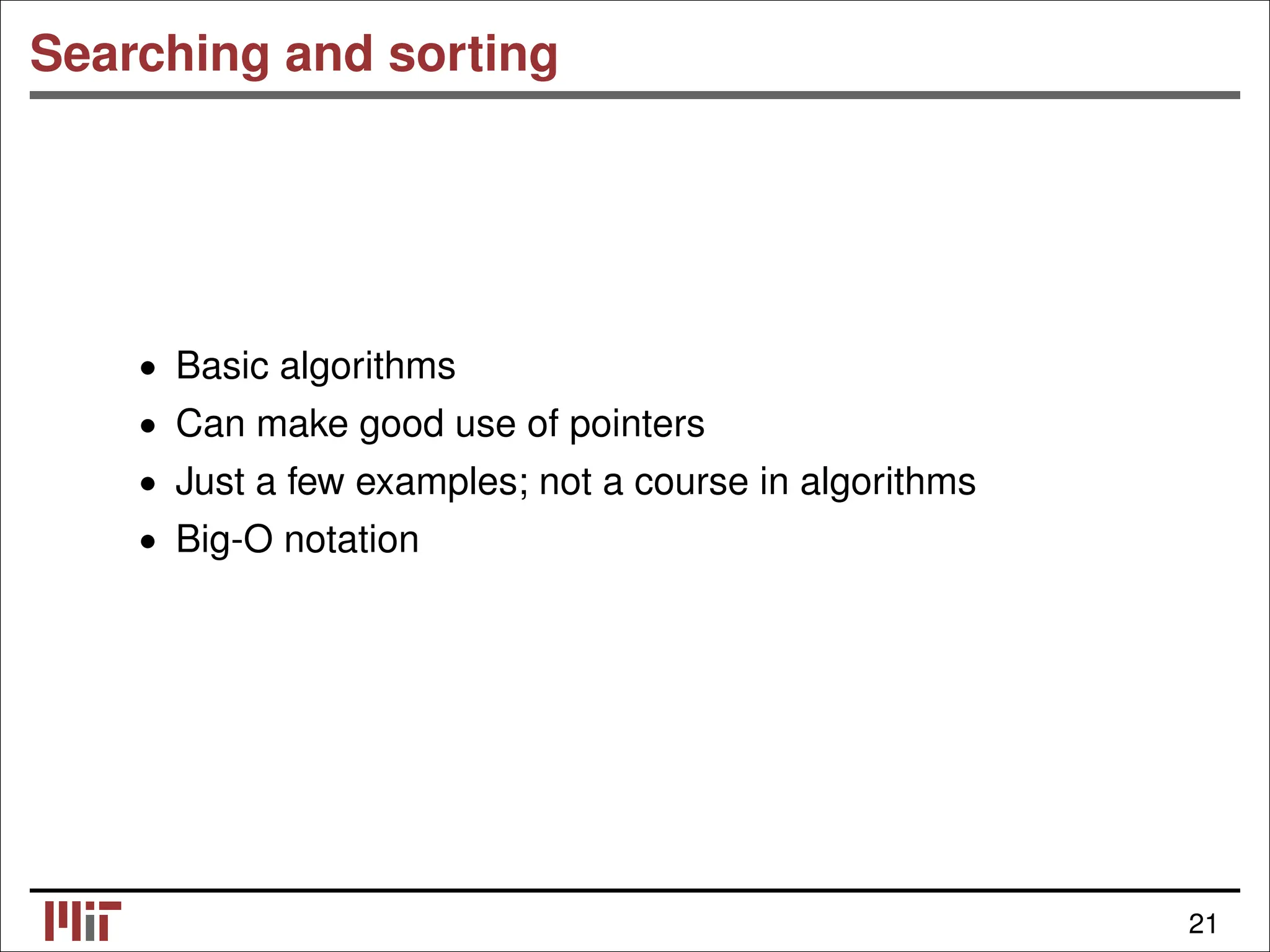
![Searching an array • Suppose we have an array of int’s int arr [100]; /∗ array to search ∗/ • Let’s write a simple search function: int linear_search ( int val ) { ∗ int parr , parrend = arr + array_length ( arr ) ; ∗ ∗ for ( parr = arr ; parr < parrend ; parr ++) { i f (∗ parr == val ) return parr ; } return NULL; } 22](https://image.slidesharecdn.com/stringc-240816094532-6c0477d4/75/Learn-C-program-in-Complete-c-programing-string-and-its-functions-like-array-pdf-29-2048.jpg)
![A simple sort • A simple insertion sort: O(n2) • iterate through array until an out-of-order element found insert out-of-order element into correct location • • repeat until end of array reached • Split into two functions for ease-of-use int arr [ 1 0 0 ] ; /∗ array to sort ∗/ void shift_element ( unsigned int i ) { /∗ do i n s e r t i o n of out−of−order element ∗/ } void i n s e r t i o n _ s o r t ( ) { /∗ main i n s e r t i o n sort loop ∗/ /∗ c a l l shift_element ( ) f o r each out−of−order element ∗/ } 23](https://image.slidesharecdn.com/stringc-240816094532-6c0477d4/75/Learn-C-program-in-Complete-c-programing-string-and-its-functions-like-array-pdf-30-2048.jpg)
![Shifting out-of-order elements • Code for shifting the element /∗ move previous elements down u n t i l i n s e r t i o n point reached ∗/ void shift_element ( unsigned int i ) { int ivalue ; /∗ guard against going outside array ∗/ for ( ivalue = arr [ i ] ; i && arr [ i −1] > ivalue ; i −−) arr [ i ] = arr [ i −1]; /∗ move element down ∗/ arr [ i ] = ivalue ; /∗ i n s e r t element ∗/ } 24](https://image.slidesharecdn.com/stringc-240816094532-6c0477d4/75/Learn-C-program-in-Complete-c-programing-string-and-its-functions-like-array-pdf-31-2048.jpg)
![Insertion sort • Main insertion sort loop /∗ i t e r a t e u n t i l out−of−order element found ; s h i f t the element , and continue i t e r a t i n g ∗/ void i n s e r t i o n _ s o r t ( void ) { unsigned int i , len = array_length ( arr ) ; for ( i = 1; i < len ; i ++) i f ( arr [ i ] < arr [ i −1]) shift_element ( i ) ; } • Can you rewrite using pointer arithmetic instead of indexing? 25](https://image.slidesharecdn.com/stringc-240816094532-6c0477d4/75/Learn-C-program-in-Complete-c-programing-string-and-its-functions-like-array-pdf-32-2048.jpg)
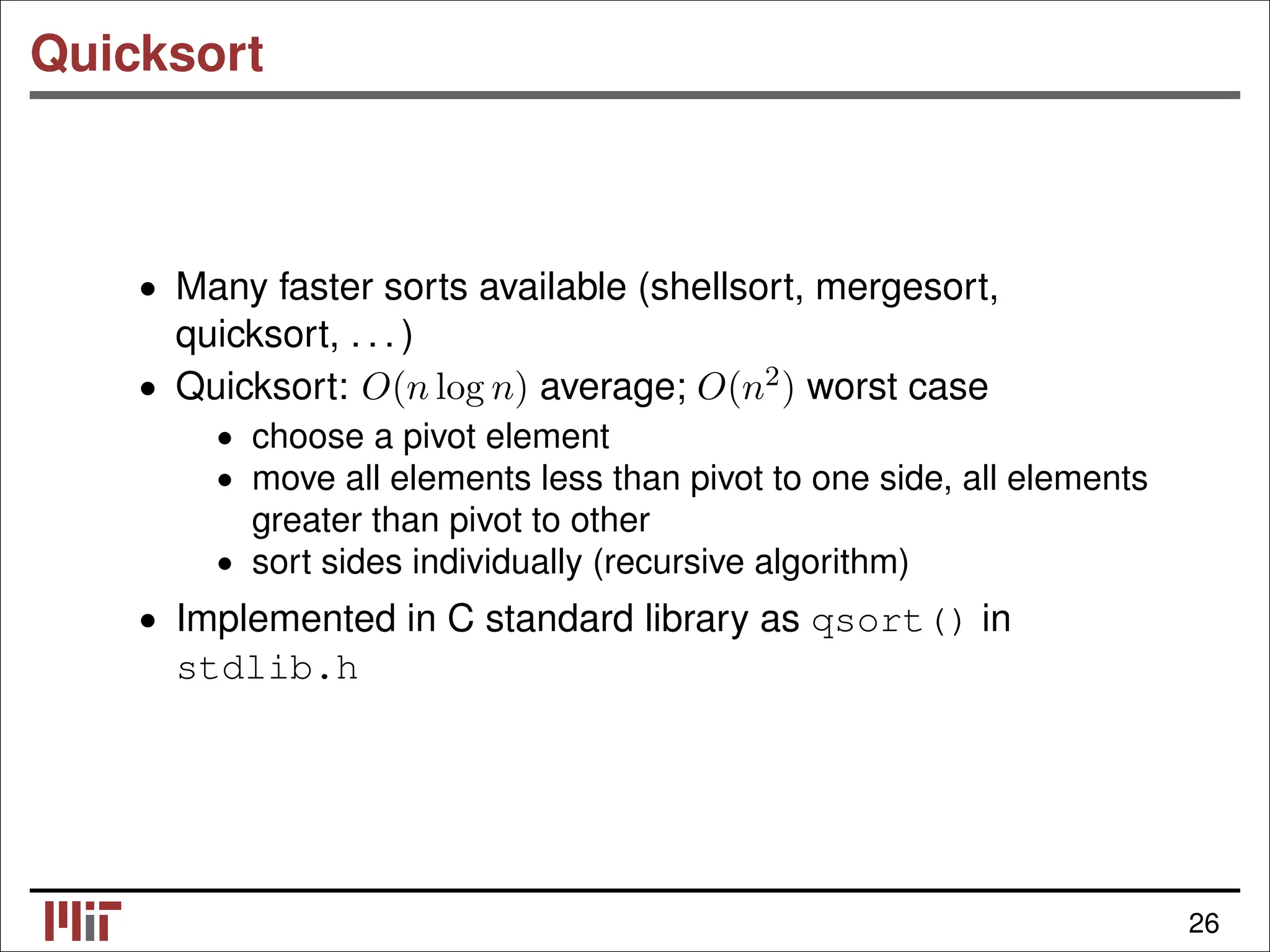
![Quicksort implementation • Select the pivot; separate the sides: void quick_sort ( unsigned int l e f t , unsigned int r i g h t ) { unsigned int i , mid ; int pivot ; i f ( l e f t >= r i g h t ) return ; /∗ nothing to sort ∗/ /∗ pivot i s midpoint ; move to l e f t side ∗/ swap( arr + l e f t , arr + ( l e f t + r i g h t ) / 2 ) ; pivot = arr [ mid = l e f t ] ; /∗ separate i n t o side < pivot ( l e f t +1 to mid ) and side >= pivot ( mid+1 to r i g h t ) ∗/ for ( i = l e f t +1; i <= r i g h t ; i ++) i f ( arr [ i ] < pivot ) swap( arr + ++mid , arr + i ) ; [Kernighan and Ritchie. The C Programming Language. 2nd ed. Prentice Hall, 1988.] © Prentice Hall. All rights reserved. This content is excluded from our Creative Commons license. For more information, see http://ocw.mit.edu/fairuse. 27](https://image.slidesharecdn.com/stringc-240816094532-6c0477d4/75/Learn-C-program-in-Complete-c-programing-string-and-its-functions-like-array-pdf-34-2048.jpg)
![Quicksort implementation • Restore the pivot; sort the sides separately: /∗ restore pivot p os it io n ∗/ swap( arr + l e f t , arr +mid ) ; /∗ sort two sides ∗/ i f ( mid > l e f t ) quick_sort ( l e f t , mid −1); i f ( mid < r i g h t ) quick_sort ( mid+1 , r i g h t ) ; } • Starting the recursion: quick_sort(0, array_length(arr) − 1); [Kernighan and Ritchie. The C Programming Language. 2nd ed. Prentice Hall, 1988.] © Prentice Hall. All rights reserved. This content is excluded from our Creative Commons license. For more information, see http://ocw.mit.edu/fairuse. 28](https://image.slidesharecdn.com/stringc-240816094532-6c0477d4/75/Learn-C-program-in-Complete-c-programing-string-and-its-functions-like-array-pdf-35-2048.jpg)
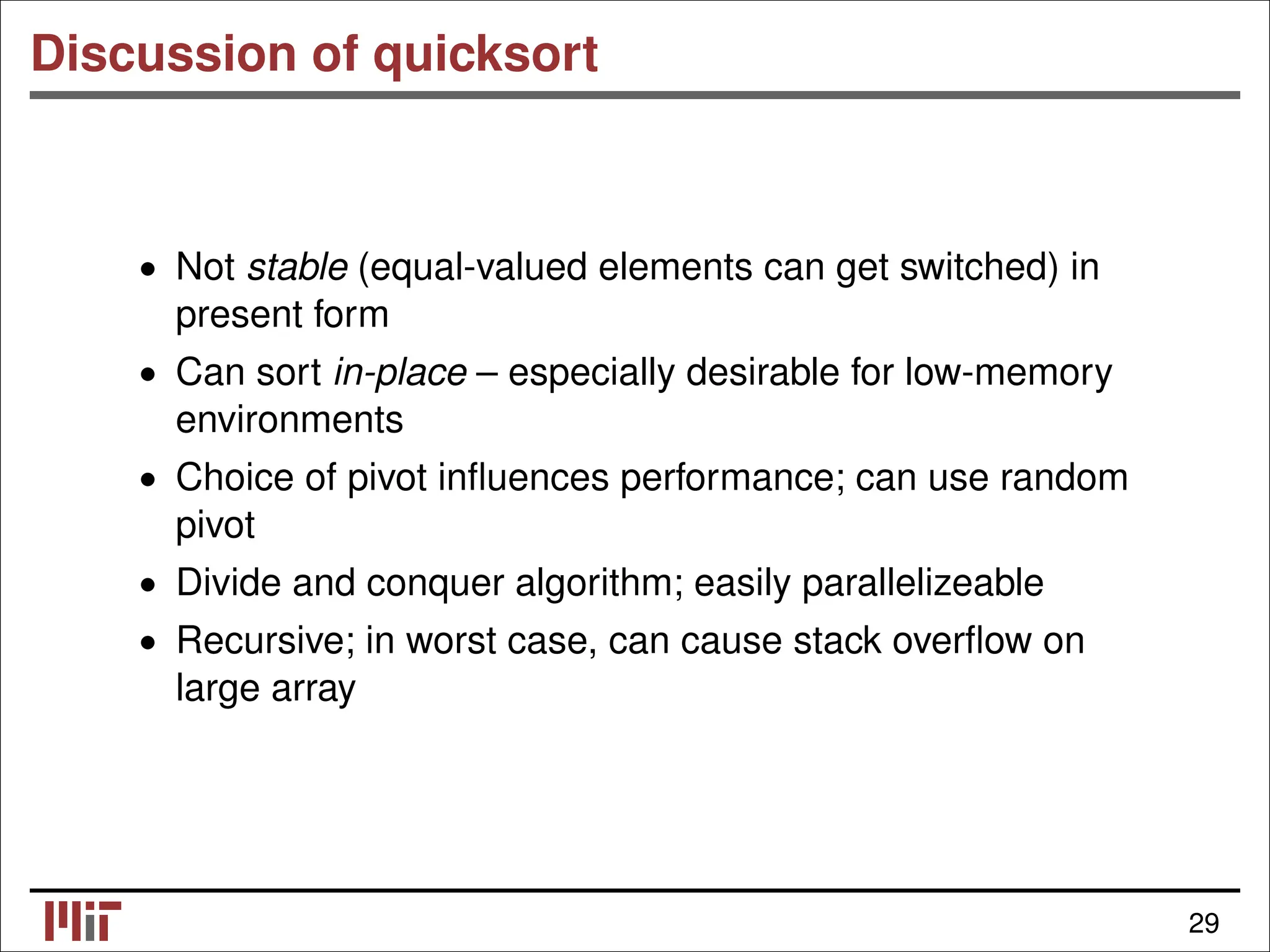
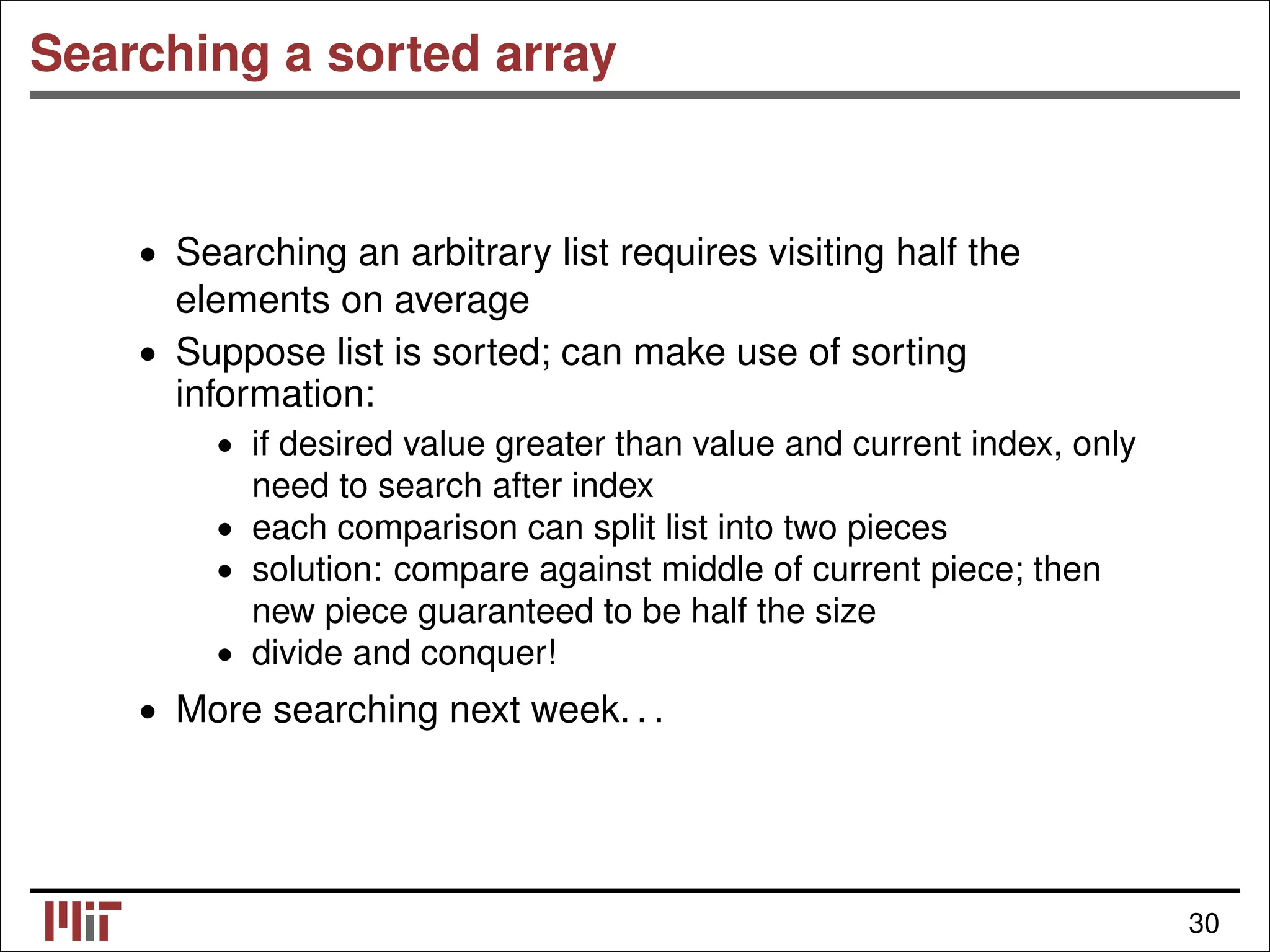
![Binary search • Binary search: O(log n) average, worst case: int binary_search ( int val ) { ∗ unsigned int L = 0 , R = array_length ( arr ) , M; while ( L < R) { M = ( L+R−1)/2; i f ( val == arr [M] ) return arr +M; /∗ found ∗/ else i f ( val < arr [M] ) R = M; /∗ in f i r s t h a l f ∗/ else L = M+1; /∗ in second h a l f ∗/ } return NULL; /∗ not found ∗/ } 31](https://image.slidesharecdn.com/stringc-240816094532-6c0477d4/75/Learn-C-program-in-Complete-c-programing-string-and-its-functions-like-array-pdf-38-2048.jpg)
